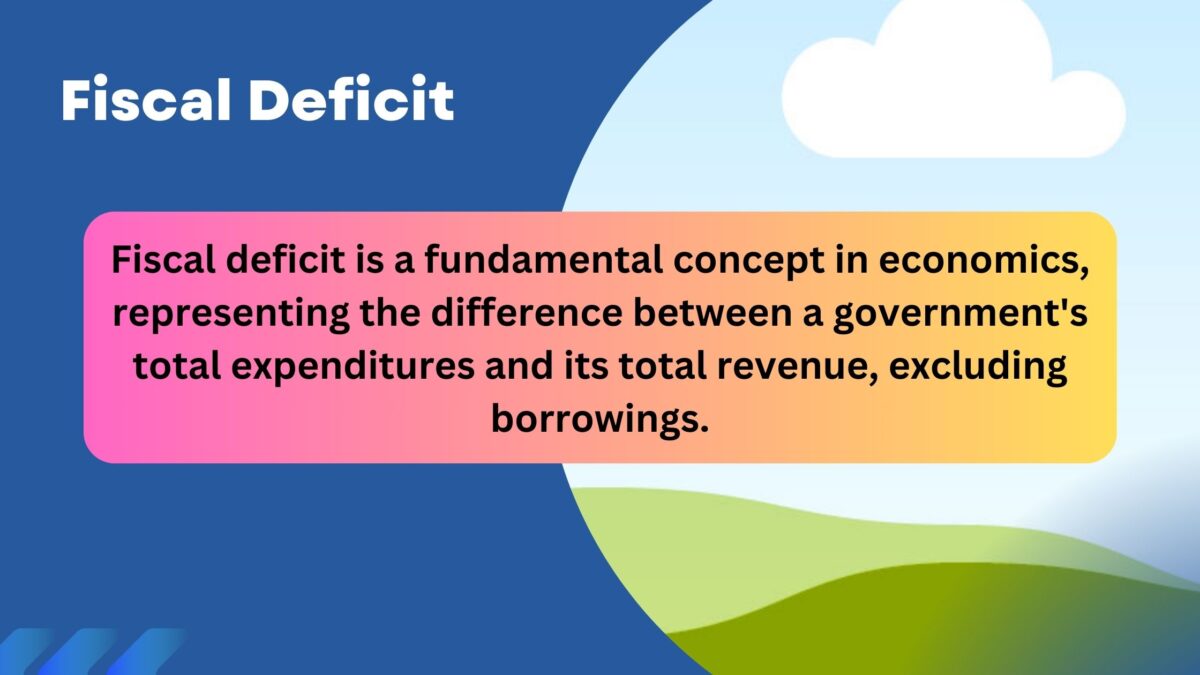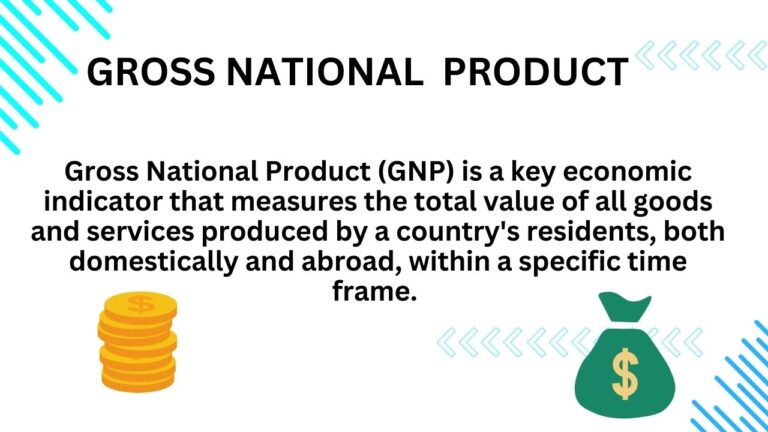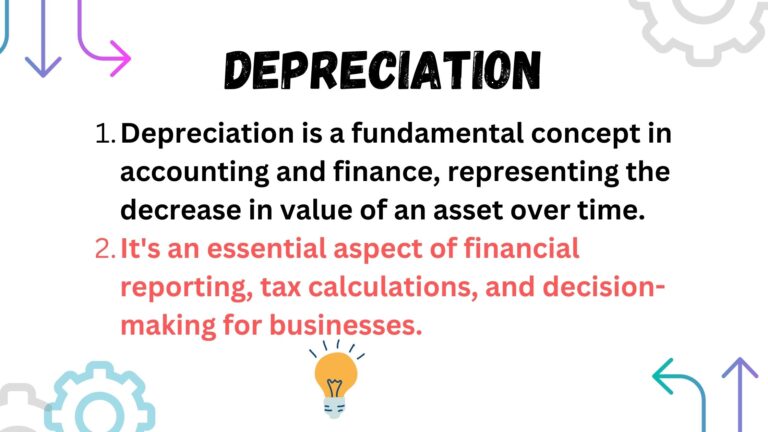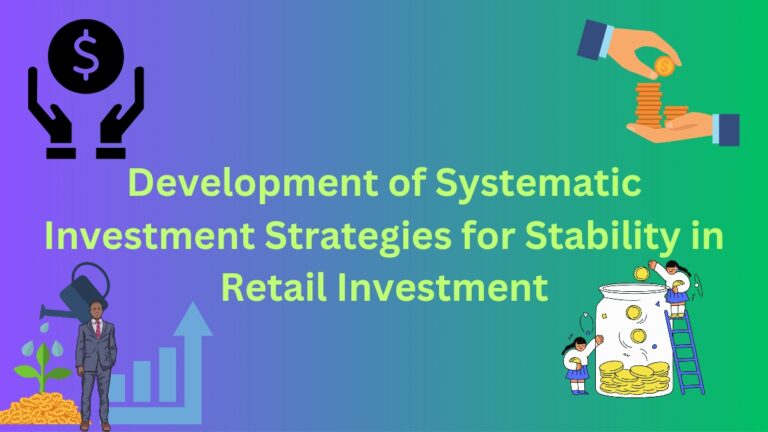How To Become Financially Independent Without Doing Traditional Job in 2024
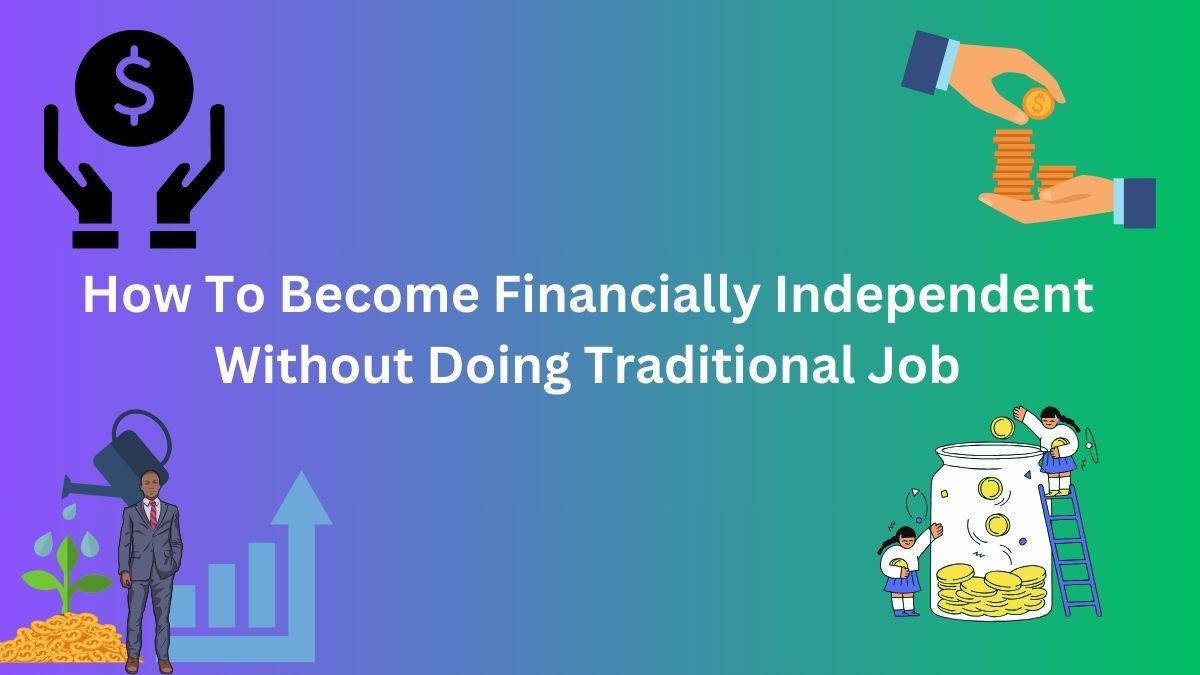
How to become financially independent without doing traditional job: Everybody wants to become financially independent, financially stable and happy. But, are there ways by or through which one can become financially independent? The answer of this question is “Yes”. Although, the answer is short, becoming financially independent is not an overnight action or journey. It is the result of application of hardwork, patience, perseverance and intelligence.
However, most of the people think that job is the ultimate source of money. So, they want to work under any government organisation or private organisation. Keep in mind that doing any type of traditional job one can’t become a billionaire.
Here, we’ll explore strategies, mindset shifts, and actionable steps to help you chart a course towards financial independence without relying on traditional employment. Whether you aspire to embark on entrepreneurial ventures, embrace passive income streams, or leverage the power of technology, this guide will equip you with the insights and inspiration to turn your financial aspirations into reality. So, let’s dive in and unlock the keys to financial independence together.
What is financial independence?

Financial independence refers to a state in which an individual or household has enough financial resources to sustain their desired lifestyle without being reliant on a traditional job or employment income.
- Financial independence typically involves accumulating sufficient savings, investments, and assets which can generate passive income streams.
- Financial independence allows individuals the freedom to pursue their interests, passions, and goals without being constrained by financial obligations.
- It provides a sense of security and flexibility, enabling people to make choices based on personal fulfilment rather than financial necessity.
However, the concept of financial independence can vary from person to person depending on their lifestyle and goals. Many people strive for financial independence as a long-term financial goal. They aim to achieve it through strategies such as building passive income streams, reducing expenses, and investing wisely.
The misconception that a traditional job is the only path to become financially independent
The misconception that a traditional job is the only path to financial independence stems from societal norms and traditional notions of employment. However, this viewpoint overlooks the many alternative paths and strategies that individuals can pursue to achieve financial independence. Here are some key points to consider:
- Passive Income Streams:
- Financial independence can be achieved through various passive income streams like Investments in stocks, bonds, real estate, or businesses can generate ongoing income without requiring active participation in a conventional job.
- Rental properties, dividends from stocks, royalties from intellectual property, and interest from bonds are examples of sources of passive income.
- Entrepreneurship and Business Ownership:
- Starting and running a successful business can be a powerful path to financial independence.
- With the advent of the internet and e-commerce, the barriers to starting a business have significantly decreased.
- Freelancing and Consulting:
- Individuals achieve financial independence through freelancing or consulting work.
- Freelancers and consultants can leverage their skills and expertise to work with multiple clients and command higher rates.
- Financial Independence Retire Early (FIRE):
- The FIRE movement has gained popularity in recent years, advocating for aggressive saving and investing to achieve financial independence at a young age, often in their 30s or 40s.
- Followers of the FIRE movement prioritize frugality, saving a high percentage of their income and accumulate a sufficient nest egg to support their desired lifestyle indefinitely.
Importance of having the right mindset to become financially independent

Having the right mindset is crucial for achieving financial independence as it shapes your attitudes, beliefs, and behaviours towards money. Here is why right mindset is important:
- Clarity of Goals: A positive mindset helps you clarify your financial goals and envision the life you want to live.
- Resilience and Persistence: The journey to financial independence often involves challenges, setbacks, and obstacles. So, a resilient mindset allows you to bounce back from failures, learn from mistakes, and stay persistent in pursuit of your goals despite adversity.
- Financial Discipline: Financial independence requires discipline in managing your money, spending wisely, and saving consistently prioritize long-term financial security over short-term gratification.
- Adaptability and Openness to Learning: The financial landscape is constantly evolving, with new opportunities and risks emerging over time. However, a growth mindset encourages adaptability and a willingness to learn new skills, strategies, and financial literacy to grab the opportunities.
- Risk Management: Building wealth and achieving financial independence often involves taking calculated risks, whether in investing, entrepreneurship, or career choices. A balanced mindset can help you assess risks rationally, make informed decisions to protect your financial future.
Need for discipline, patience, and resilience to become financially independent
Discipline, patience, and resilience are indispensable virtues on the journey to financial independence. Here’s why discipline, patience, and resilience are crucial:
- Discipline: Discipline is the cornerstone of financial success. It involves the ability to stick to a plan, stay focused on long-term goals, and make consistent efforts to achieve them.
- Patience: Patience is a virtue that is particularly relevant in the context of financial independence. Building wealth and achieving financial freedom is a gradual process that unfolds over time. Patience allows individuals to embrace the journey, trusting that consistent efforts and prudent decisions will yield results in the long run.
- Resilience: Resilience is the ability to bounce back from setbacks, adapt to change, and persevere in the face of adversity. On the path to financial independence, there will inevitably be obstacles, failures, and unexpected challenges. Resilience enables individuals to learn from setbacks, pivot when necessary, and stay committed to their goals despite setbacks.
Discuss the concept of multiple income streams to become financially independent
Multiple income streams are the backbone of financial independence, offering individuals the freedom and flexibility to diversify their sources of revenue. Here’s a deeper dive into the concept of multiple income streams:
- Diversification of Income:
- Relying solely on a single source of income, such as a salary from a job, leaves individuals vulnerable to economic downturns, job loss, or unexpected expenses.
- whereas, multiple income streams provide a buffer against such risks by spreading income sources across different channels.
- Increased Earning Potential: As individuals scale and expand their income streams, they can gradually increase their earning potential, moving closer to financial independence with each additional source of income.
- Risk Management: Different income streams carry varying degrees of risk and volatility. By diversifying across multiple streams, individuals can spread risk and minimize exposure to any single source of uncertainty.
- Passive Income Generation: One of the key advantages of multiple income streams is the potential to generate passive income. Passive income streams, such as dividends from investments, rental income from properties, or royalties from creative work, require minimal ongoing effort once established.
Ways to become financially independent without doing formal jobs
Here are the differenct ways to become financially independennt without doing formal jobs:
- Investments: Investing in stocks, bonds, mutual funds, real estate, and other financial instruments can generate passive income and capital appreciation over time. Dividend-paying stocks, interest-bearing bonds, and rental properties can provide recurring income streams, while capital gains from long-term investments can contribute to wealth accumulation.
- Rental Income: Owning rental properties can be a reliable source of passive income, as tenants pay rent that covers mortgage payments, property maintenance, and generates profit. Rental income can provide steady cash flow and long-term appreciation potential, making it a popular investment strategy for achieving financial independence.
- Freelancing: Freelancing allows individuals to offer their skills and services on a contract basis to clients or companies. Freelancers have the flexibility to work on multiple projects simultaneously and in this ways freelancers can generate substantial income streams.
- Online Business: Starting an online business, whether in e-commerce, digital products, affiliate marketing, or content creation. With low startup costs and the potential to reach a global audience, online businesses can generate passive income and create wealth over time.
Importance of investing as a means to generate passive income to become financially independent
Investing is a crucial means of generating passive income and plays a vital role in achieving financial independence for several reasons:
- Compound Growth: Through the power of compounding, investments have the potential to grow exponentially over time.
- Diversification: Investing enables you to diversify your income sources and reduce risk. By spreading your investments across different asset classes, such as stocks, bonds, real estate, and commodities, you can mitigate the impact of market volatility and economic downturns.
- Steady Income: Certain investment vehicles, such as dividend-paying stocks, bonds, and real estate investment trusts (REITs), offer regular income payments to investors. These dividends, interest payments, or rental income provide a steady stream of passive income.
- Tax Efficiency: Many investment strategies offer tax advantages that can enhance your passive income. For example, dividends from qualified stocks may be taxed at a lower rate, certain retirement accounts provide tax-deferred growth or tax-free withdrawals.
- Long-Term Wealth Building: Investing is a proven strategy for building long-term wealth and achieving financial independence. By consistently saving and investing over time, you can accumulate a substantial portfolio.
Investment Strategies to become financially independent
Here’s a closer look at some of the most common types of investments strategies:
- Stocks: Stocks represent ownership in a publicly traded company. When you buy stocks, you’re essentially buying a share of ownership in that company.
- Bonds: Bonds are debt securities issued by governments, municipalities, or corporations to raise capital. When you buy a bond, you’re essentially lending money to the issuer in exchange for periodic interest payments (coupon payments) and the return of the principal amount at maturity.
- Real Estate: Real estate investments involve purchasing property to generate rental income and/or capital appreciation.Real estate can include residential properties (such as single-family homes, apartments, and condominiums), commercial properties (such as office buildings, retail spaces, and industrial warehouses), and vacant land.
- Mutual Funds: Mutual funds pool money from multiple investors to invest in a diversified portfolio of stocks, bonds, or other assets. Professional fund managers oversee the fund’s investments and make decisions on behalf of the investors
- Exchange-Traded Funds (ETFs): ETFs are similar to mutual funds but trade on stock exchanges like individual stocks. They typically track a specific index, sector, commodity, or asset class and aim to replicate its performance.
- Alternative Investments: Alternative investments encompass a wide range of non-traditional assets beyond stocks, bonds, and real estate. Examples include hedge funds, private equity, venture capital, commodities, cryptocurrencies, and collectables.
The role of frugality and minimalism in achieving financial independence
Here’s how frugality and minimalism principles contribute to the journey towards financial independence:
- Mindful Spending: Frugality encourages individuals to be intentional with their spending, focusing on essential expenses and eliminating wasteful or unnecessary purchases.
- Living Below Means Frugality advocates for living below one’s means, which involves spending less than what you earn and saving the difference. By maintaining a modest lifestyle and avoiding lifestyle inflation, individuals can increase their savings rate and accelerate their progress towards financial independence.
- Debt Reduction and Avoidance: Frugality encourages individuals to minimize debt and avoid high-interest loans or credit card debt. By prioritizing debt repayment and living within their means, individuals can free up more income for savings and investments.
- Minimalism and Decluttering: Minimalism emphasizes simplifying one’s life by decluttering physical possessions, reducing consumption, and focusing on experiences rather than material possessions. By adopting a minimalist lifestyle, individuals can reduce spending on unnecessary items, avoid impulse purchases, and prioritize experiences and relationships over material goods.
- Building Emergency Fund: Frugality facilitates the accumulation of an emergency fund, which serves as a financial safety net for unexpected expenses or income disruptions
- Sustainable Lifestyle Choices: Frugality and minimalism often align with sustainability principles, promoting eco-friendly and resource-efficient lifestyle choices.
Reducing expenses is a crucial step towards achieving financial independence
Here are some practical tips on how to reduce expenses:
- Create a Budget:Start by creating a budget that outlines your income and expenses. List all sources of income and track your spending across various categories such as housing, transportation, food, utilities, entertainment, and discretionary expenses.
- Track Your Expenses: Keep track of your expenses regularly, either manually or by using budgeting apps or software. Review your spending patterns and identify areas where you may be overspending or making unnecessary purchases.
- Prioritize Needs Over Wants: Distinguish between needs and wants and prioritize spending on essentials such as housing, food, utilities, and healthcare.
- Cut Discretionary Spending: Look for opportunities to cut back on discretionary expenses such as dining out, entertainment, subscriptions, memberships, and impulse purchases.
- Negotiate Bills and Expenses: Negotiate with service providers such as cable companies, internet providers, insurance companies, and utility providers to lower your bills.
- Reduce Housing Costs: Housing is often one of the largest expenses for individuals and families. Consider downsizing to a smaller home or apartment, refinancing your mortgage to lower interest rates, or exploring co-living arrangements or house hacking to reduce housing costs.
- Save on Transportation: Explore alternative transportation options such as walking, biking, carpooling, or using public transportation to save on gas, parking, and maintenance costs.
- Shop Smart and Save: Be strategic about your shopping habits and look for opportunities to save money on groceries, household items, and other essentials.
- Review and Adjust Regularly: Regularly review your budget and expenses to track your progress and identify areas for improvement.
Importance of having an emergency fund for financial security
Here are several reasons why having an emergency fund is essential for financial stability:
- Protection Against Unforeseen Expenses
- Financial Peace of Mind
- Prevention of Debt Accumulation
- Maintaining Financial Stability
- Reducing Reliance on External Assistance
- Faster Recovery from Financial Setbacks
- Opportunity to Seize Opportunities
Tips on how to build an emergency fund to become financially independent
Building an emergency fund is a crucial step towards achieving financial security and becoming financial independent. Here are some practical tips to help you establish and grow your emergency fund:
- Set a Savings Goal
- Create a Budget
- Automate Your Savings
- Start Small and Consistent
- Cut Expenses and Increase Income
- Use Windfalls Wisely
- Prioritize High-Interest Debt
- Keep Your Emergency Fund Accessible
- Stay Committed and Flexible
Conclusion
In conclusion, achieving financial independence without traditional employment is a journey that requires dedication, creativity, and strategic planning.
Remember, there’s no one-size-fits-all approach, so it’s essential to assess your unique circumstances and goals while remaining adaptable to changing economic landscapes. With perseverance and smart decision-making, you can pave your path to financial freedom and become financially independent.
Read more:



